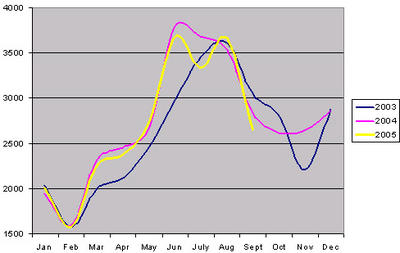The Greater Fool
Popular media once again feeds the frenzy creating a crop of greater fools through unrealistic television reality shows.
If anyone is looking for a greater fool to pass the hot potato to, here they are:
It's hip to flip real estate
Take a peek, the picture they paint is absolutely unbelievable. It's no wonder we're in a market like this, the mass of sheeple have conspired in the greatest get rich quick scheme ever created.
Cutler agrees. You'll succeed as a flipper, he says, "if you do it wisely. Study, anticipate the unexpected, and use reliable contractors and subcontractors, or you might take a risk and fail."
So there it is everyone, we're all wrong, all you need to do is study, anticipate the unexpected, and you too can be a real estate tycoon! I wonder how many would-be tycoons were created based on these television shows, my guess, quite a few.
Have any of you ever watched these shows? I can sum it up, a bunch of hacks do a hack-job on a run down shack and almost always walk away rich. I guarantee if you watch a few hours of these shows, you too will run out the door, check book in hand, ready to find the fortune you deserve.
Boy-o-boy. There is a great anecdote about the stock market crash right before the great depression (it's been said it's a myth, but who cares, it's appropriate) Joe Kennedy stopped to get his shoes shined, and the shoe shine boy was giving him stock tips and telling him how to get rich in stocks. That day, he sold all the stock he owned, and the market crashed soon after. The moral of the story, when the shoeshine boys start talking about something, make sure you aren't in it.
These TV shows are made up of nothing but shoe shine boys. Go out on the street, ask anyone to give you a way to make alot of money quick, I bet you the majority will say real estate. Popular media, tv, newspapers, they all seem to push this nonsense with no regard for the real consequences. All shoe shine boys with their get rich quick schemes. There is only one way this mania will end, I'll give you a hint, it's not going to be with everyone a real estate millionaire.
I'll leave you with one last parting thought, an old poker quote..
If you can't find the sucker at the table, it's because the sucker is you.
Caveat Emptor,
Grim
If anyone is looking for a greater fool to pass the hot potato to, here they are:
It's hip to flip real estate
Take a peek, the picture they paint is absolutely unbelievable. It's no wonder we're in a market like this, the mass of sheeple have conspired in the greatest get rich quick scheme ever created.
Cutler agrees. You'll succeed as a flipper, he says, "if you do it wisely. Study, anticipate the unexpected, and use reliable contractors and subcontractors, or you might take a risk and fail."
So there it is everyone, we're all wrong, all you need to do is study, anticipate the unexpected, and you too can be a real estate tycoon! I wonder how many would-be tycoons were created based on these television shows, my guess, quite a few.
Have any of you ever watched these shows? I can sum it up, a bunch of hacks do a hack-job on a run down shack and almost always walk away rich. I guarantee if you watch a few hours of these shows, you too will run out the door, check book in hand, ready to find the fortune you deserve.
Boy-o-boy. There is a great anecdote about the stock market crash right before the great depression (it's been said it's a myth, but who cares, it's appropriate) Joe Kennedy stopped to get his shoes shined, and the shoe shine boy was giving him stock tips and telling him how to get rich in stocks. That day, he sold all the stock he owned, and the market crashed soon after. The moral of the story, when the shoeshine boys start talking about something, make sure you aren't in it.
These TV shows are made up of nothing but shoe shine boys. Go out on the street, ask anyone to give you a way to make alot of money quick, I bet you the majority will say real estate. Popular media, tv, newspapers, they all seem to push this nonsense with no regard for the real consequences. All shoe shine boys with their get rich quick schemes. There is only one way this mania will end, I'll give you a hint, it's not going to be with everyone a real estate millionaire.
I'll leave you with one last parting thought, an old poker quote..
If you can't find the sucker at the table, it's because the sucker is you.
Caveat Emptor,
Grim

